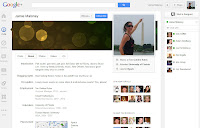A blogger on Lifehacker.com recently conducted an unscientific study regarding online privacy by lowering his security settings and signing up for location-based services, such as Foursquare. The results were interesting because after 3 weeks he had opened up to the idea of using certain location-based services, which kind of forced him to widen his social circles and keep in touch with friends who happened to be in his neighborhood. Admittedly, he did have some strange run-ins and one instance when he was caught in a lie by broadcasting his information. Anyone who’s been using social media for any length of time has had that awkward conversation with an acquaintance who seems to know all about what you’ve been up to even though you haven’t spoken in months.
The part that I found really interesting was this writer’s distaste for personalized ads. He even went so far as to say that he purposely avoided buying products that advertised directly to him. I know I have a somewhat skewed view of advertising since I am in the marketing industry, but I always thought personalized ads were a convenience. I’m careful about securing my personal information, such as my social security number and bank account, but I am pretty open about my online habits. My feeling is that if you’re going to see ads no matter what, wouldn’t you rather see something you might be mildly interested in rather than ads for things that have absolutely no value to you? Let us know your thoughts in the comments section.
















